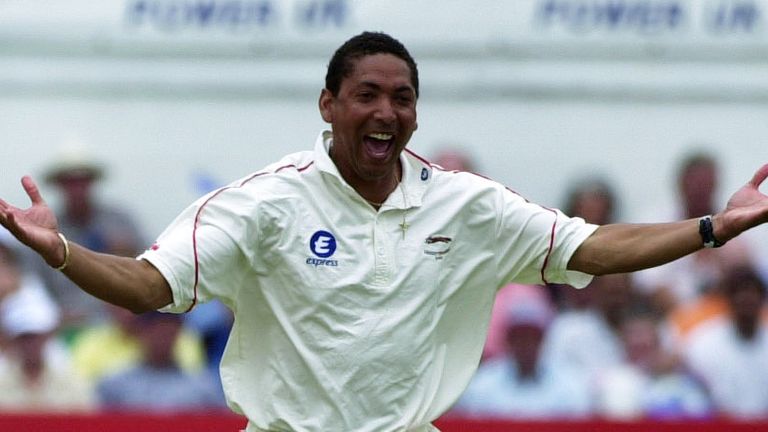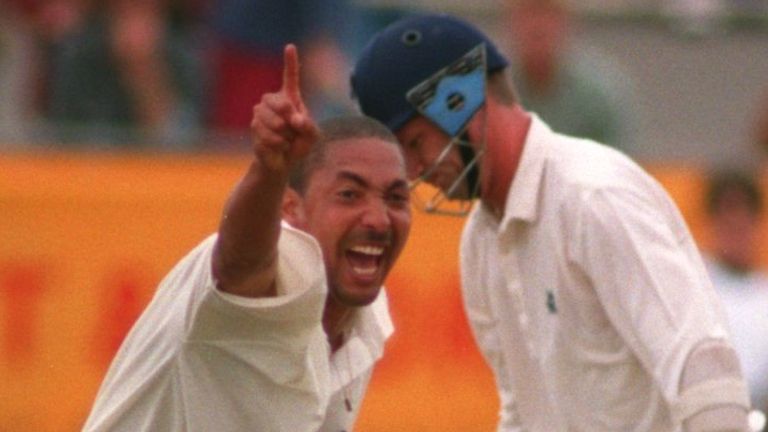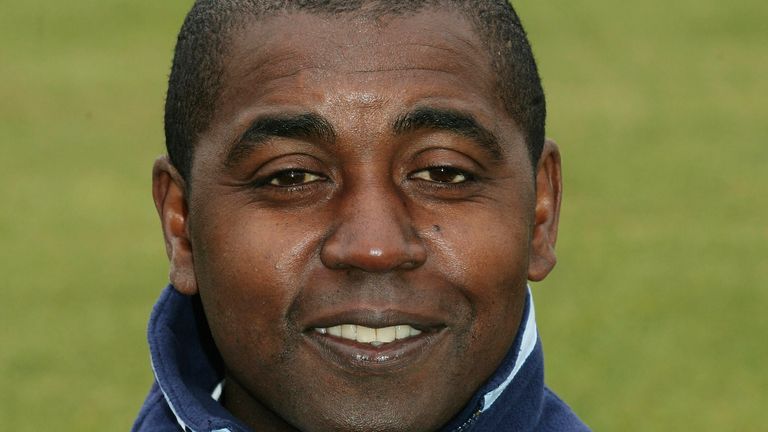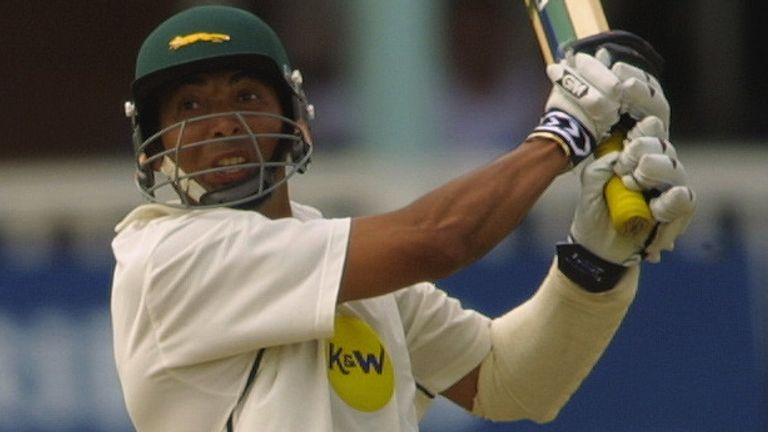'If you play for England, we will shoot you' - Phillip DeFreitas on racist abuse he received
Phillip DeFreitas, Ebony Rainford-Brent and Mark Alleyne on Black Lives Matter movement, their personal experiences of racism, and how cricket can re-engage with black communities
Friday 3 July 2020 10:03, UK
'If you play for England, we will shoot you'.
That's the chilling threat made by the National Front against Phillip DeFreitas' life during the former all-rounder's career.
DeFreitas speaks candidly and passionately about the traumatic racism he suffered as an international cricketer in a Sky Cricket Vodcast focusing on diversity in the game, which you can watch in the YouTube stream above or listen to as a podcast in the Spotify player below.
The 54-year-old shares his experiences with host Mark Butcher as a player and coach, and urges the current England teams to "stand up and be counted" in the fight against racism.
DeFreitas is joined on the podcast by three people determined to continue the conversation sparked by the murder of George Floyd in Minnesota in May and projected around the world by the Black Lives Matter movement in the hope of making systematic change.
Former Gloucestershire captain and coach Mark Alleyne, broadcaster and current director of Women's Cricket at Surrey Ebony Rainford-Brent, and Raj Tulsiani - author of Diversity and Inclusion for Leaders, and Chief Executive Officer of Green Park - make up the rest of the panel.
Together, they discuss a range of topics including the reasons why there are so few black players in professional cricket, their personal experiences of racism, and how cricket can re-engage with black communities.
DeFreitas made his Test debut in the 1986/87 Ashes at the age of 20 alongside two of his heroes - Ian Botham and Allan Lamb - but says that he encountered racism from school level upwards on his way to the top, even after turning professional at Leicestershire in 1985.
"I always felt that I had to be twice as good as a white person, which is quite sad that I felt that way," he said.
"There was that feeling where you felt you were just on your own all the time. People used to say 'why don't you get involved', 'why don't you be more with the team'. You felt lonely, you felt all on your own. It was really tough.
"To have Gladstone Small and Chris Lewis playing for England was fantastic - it made you feel a bit better, but never secure. I never felt welcome; I always felt like every game was my last game. I was desperate to play for England and that kept me going.
"I received hate letters from the National Front - it's not only once, I received that two or three times, saying 'If you play for England, we will shoot you'.
"I had police looking after my house. I had a sponsored car with my name on it and I had to remove that. So can you imagine me driving down to London?
"I'm in a hotel two days before a Test match at Lord's and I'm thinking 'do I play or don't I? Am I going to have a sniper?'
"How can I focus on playing cricket for England with all that but, with my determination, I would not allow those people to beat me ever.
"I had no help, I had no support; I had to deal with that all on my own, it hurts quite a lot. I remember going home to my Mum and saying 'I don't feel like I belong there'. But I'm proud of what I achieved."
Since DeFreitas played the last of his 44 Tests in 1995, the number of black professional players in cricket has fallen by 75 per cent, and there are currently no black head coaches or decision-makers in the men's game.
On the podcast, DeFreitas and Alleyne shared their frustration at being unable to pursue a career as a first-class coach despite possessing a wealth of cricketing knowledge.
Alleyne did coach Gloucestershire for four seasons from 2004, the first two of them while he was still a player, leading the county to two trophies. He went on to be Head Coach at the MCC Academy.
But although he still maintains aspirations of coaching at international level, he says getting a foothold in the first-class game has proved hard.
DeFreitas, similarly, has struggled to get a full-time role with a county, despite working in a part-time capacity for Nottinghamshire and Derbyshire.
"I applied for a few of those roles and I just kept getting the same response, really - 'you lack experience'," DeFreitas said.
"I'm a level three coach. I'm thinking 'I've got so much knowledge, I've got so much experience of the game and I'm passionate about the game - the game is my life basically'.
"I think you get to a stage where you feel 'I can't be bothered anymore' because you're not getting anywhere with this.
"I'm passionate about helping kids from all backgrounds into the game and that's why I work with London Schools Cricket Association.
"There is an opportunity but the only way we get black kids into cricket and educating them early is we have to send people like myself, who have been there and experienced it, into that community."
DeFreitas also now spends time assisting at Leicestershire's academy and says that players - particularly at England level - have never had a better platform to tackle racism than now following the worldwide impact of the Black Lives Matter movement.
It's widely anticipated that both West Indies and England will show their support for BLM during the first Test in July, perhaps with the players taking a knee, and DeFreitas says doing so would be a sign of strength and progress.
"I wish I was able to come out and stand up for what I believed when I played, and the reasons why I didn't was because I was always afraid that I'd never play for England again or that I'd be seen as a trouble-maker," he said.
"The guys now have a great opportunity to stand up, be counted, and send the message out because this is going on and people are supporting them. I never felt I had that support. It was a scary place back then."






